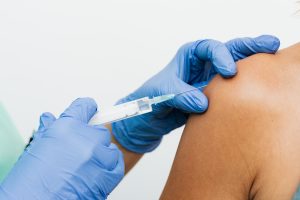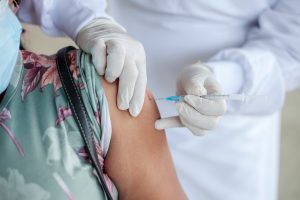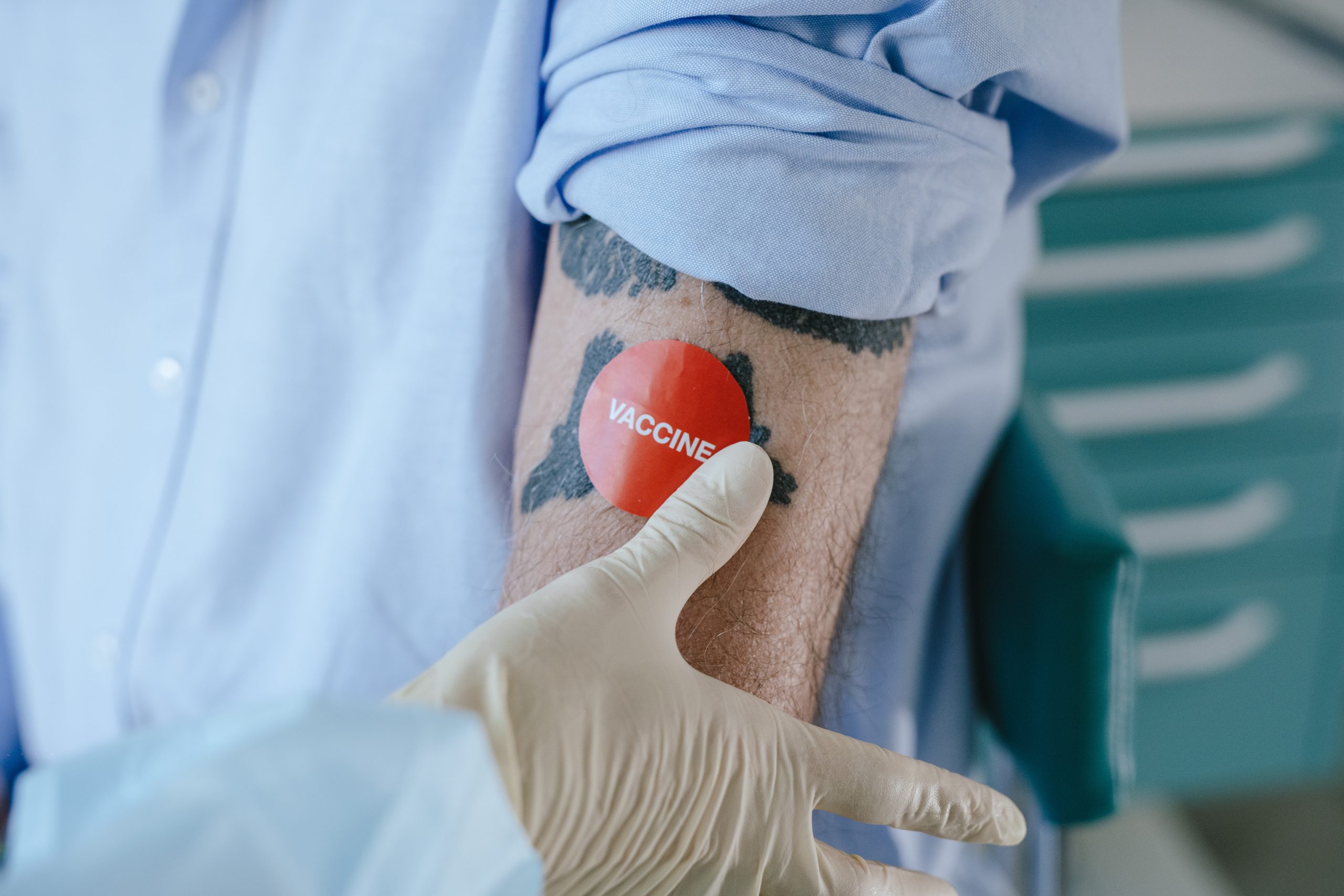Arm pain after vaccine is a common impact after taking the Covid vaccine. It is not serious and will go away in time, but it can be worrisome.
In most cases, arm pain fades away in 10 to 20 minutes and should not cause any problems. If you’ve ever seen or felt an arm coming out of its socket after getting a vaccination, you may ask yourself, “What caused that?”
It turns out that vaccines can sometimes cause arm pain in some people, and there are some precautions you can take to avoid this. Ensure your doctor gives you all the necessary information about what shots and vaccinations are advisable for your age and other risk factors.
See, it’s not so scary! But avoid this painful incident with proper knowledge about risks beforehand.
Table of Contents
Common Vaccine Side Effects
Most people notice a slight arm pain after a vaccine shot, but this side effect is not serious and goes away within an hour or two.
In rare cases where the reaction lasts longer than two weeks, other more serious circumstances may occur.
But these situations are rare, so it’s best to keep an eye on them and contact your health care provider if symptoms do not dissipate within a couple of days.
Most common COVID-19 vaccine side effects include
- Pain in the arm where you got the vaccine shot
- Redness in the arm where you got the covid vaccine
- Swelling in your left or right arm where you got the vaccine shot (preferably left arm)
- Tiredness
- Muscle pain
- Headache
- Fever
- Chills
- Nausea
Side effects may differ from one person to another person depending on their lifestyle and their health conditions. It is better to look at your health after getting the COVID-19 vaccine.

Why did your arm hurt after a vaccine?
Aside from the tiny pinch, you feel from the needle, vaccines contain chemicals and viruses that have been used in vaccination for years. You might be hard-pressed to find a known side effect of vaccinations.
The way vaccines work is through an immune response. It works like this: if an illness like chickenpox comes into contact with the body’s immune system, the body will develop antibodies to fight against it.
These antibodies are then sent out to every cell in your body and help fight off any other illness that your body encounters in the future. If no toxins or infections are involved in the illness, these antibodies can easily clear up any future illness.
Sometimes, a doctor will recommend more than one shot at a time. This is because some vaccines need follow-up shots to ensure that your body responds to the vaccine properly.
Biggest tip: Do not let your body become immune to the vaccine. Not getting too many vaccinations from one doctor or clinic is important.
You want your body to fight viruses and illnesses as you encounter them in real life and through natural exposure rather than getting immunity from vaccination.
To ensure your vaccines are as effective as possible, ask your doctor how much time between shots should pass before you receive another one.
How to prevent arm pain after a vaccine?
You can do some things to help prevent your arm from hurting after a vaccine.
Ask your doctor why you are having arm pain after vaccine, especially if the pain doesn’t disappear within 48 hours. He may recommend another shot.
Try these tips before and after you get your next vaccine or booster dose:
Relax your arm
When your arm is relaxed, the needle is more likely to enter the arm in a more comfortable position. While putting your arm on a table might be easier, it can also make it awkward to get a good vein.
Ask someone to hold an ice pack against your arm for 20 minutes before the shot. This will make your veins appear larger and easier to find. Take some deep breaths to relax your arm before the shot.
Your doctor is much more likely to succeed if he finds a vein easily, reducing the pain you feel.

Stay hydrated
While peeing before your shot may not seem like a good idea, it can weaken your immune system and make it harder for your body to fight off things like the flu and infections. That’s why you should never go pee right before vaccination.
Stay hydrated all day long, particularly the morning of your doctor’s appointment, but not just an hour or so before you get the shot.
Breath Deeply
Breathing deeply will help your heart beat as well as your belly, which helps increase blood flow to your arm and make it easier for the needle to pick up.
You can also try becoming more relaxed and breathing deeply to combat anxiety. Your breathing rate will naturally slow down when you’re relaxed, which is a great way to lower your heart rate and help reduce anxiety.
Keep still
Holding your arm still can be the most difficult part of getting vaccinated. If you’re having trouble staying still, try placing one hand on top of the other and resting in your lap with your arms straight in front of you. This should help keep you from squirming while the doctor gives you a shot.
What to do if your arm hurts after a vaccine?
If your arm still hurts or is red, hot, or you are experiencing pain in arm after covid vaccine and swollen after 48 hours, you should call your doctor.
You may have developed an infection, which could have been prevented with the correct follow-up vaccinations. There is a chance that the vaccine is also causing your pain.
Keep your arm elevated
If you can, you should let the needle fall a little lower than the heart so it doesn’t cause an extra sting or pinch. You will want to raise your arm for thirty to sixty minutes after getting the shot.
Stretch
While you shouldn’t do intense exercise for a few days after getting a shot, you can still do low-intensity exercises and stretches to help prevent lactic acid buildup in your muscles.
Get Rest
Since your arm is sore from the shot, you don’t want to be doing anything that will aggravate the pain. It would help if you lay down for a few minutes after the shot, but only for a short time.
Keeping your arm elevated for a longer period than five minutes may increase your risk of complications and make returning to work more difficult.
Use cold packs on sore areas.
Using cold packs on sensitive areas can also be useful if you feel your arm is hot. For example, put ice cubes in a plastic bag around your upper arm or chest area where the needle was inserted. This will help ease any pain and promote healing. Use an ice pack or cold shower if you don’t have an ice pack.
Massage sore areas
If your arm hurts after a vaccine, try to massage it as soon as possible. The sooner you can put pressure on the area and relieve some pain, the better. This will also help relax your muscles and keep them from spasming even more.
Gentle stretching is also a good idea if you can get hold of someone to help stretch out tight muscles. This will help lessen the stiffness and may prevent muscle cramps later on in your lower or upper arm area (depending on where you got the vaccine).
Find the right time
If you can help it, try to avoid getting your shot during the middle of the night. If you are getting a vaccine at midnight, try to get up early the next morning and go to work.
This will allow your body a good night’s sleep and help keep inflammation down. This is especially important if you have a strenuous job, as you may be more susceptible to pain due to your profession.
Schedule it in advance
Most doctors will not allow vaccinations if you’re undergoing chemotherapy or radiation therapy during this time frame. Also, if the area injected with the shot is painful for some reason (say an injection in a painful spot), then you should postpone your vaccine until after the pain subsides.
If your doctor is worried about the pain in your arm, he may recommend a shot made up of a stronger, more concentrated form of the vaccine to increase the amount of time it takes for your body to build immunity.
Find out where you’ll be getting this shot, and get as much detail about it as possible. Ask about what you’ll be reminded of before getting your shot.
Put in writing all of the questions you have about this specific vaccine ahead of time and ensure that whoever gives you your immunizations (i.e., a nurse, coordinator, or doctor) knows they are mandatory.

When to see your doctor?
Taking any pain, redness, or swelling in your arm is good. Call your doctor right away if you notice any of these symptoms. Even if you think you may have a normal reaction to getting a shot, it’s important to let your doctor know so they can decide whether an infection is responsible for the sudden pain and swelling.
If you experience any of the following symptoms after vaccination, you need urgent medical attention:
- In addition to the above symptoms, some patients may have an allergic reaction to the vaccine
- Anaphylactic shock can be fatal if not treated immediately, so it’s important to keep this in mind
- Don’t hesitate to call your doctor if you are experiencing any of these symptoms
- It’s important to get the proper treatment immediately, especially if it’s a life-threatening condition
- To prevent side effects such as itching or redness, try getting a flu shot instead of getting the vaccination at the last minute
- Flu shots tend to provide less pain and swelling because they’re full of fewer antigens and have a milder adjuvant than vaccines made up of bacteria or viruses
- Injecting yourself with an infected vial may also cause a reaction if something is wrong with the vaccine itself (which is rare)
How to ease the COVID vaccine arm pain?
After doing all the things that may give your arm relief, if you can’t find the ease you want, then there are a few things that can help you. They are:
- Try to apply an ice pack around your arm where you get the vaccine
- Try not to sleep on the side of the arm you got the vaccine
- Support your arm while sleeping and place a pillow underneath it
- Try to drink plenty of water
- If you are facing some side effects like fever, headache, or body aches, then a paracetamol tablet can make you feel a little relieved from the pain
- Try to consult before taking any medicine
- Try to wear oversized or loose sleeves clothes
- Don’t try to put much pressure on the arm on which you get the vaccine
Final thoughts
The COVID-19 vaccines are our only hope against the pandemic. The COVID vaccine will only take effect after multiple vaccinations over a short period. This will give us trust in the vaccine as it contains multiple pathogens. It’s our best option against the deadly pandemic.
These vaccines take on the qualities of regular vaccination. But their ability to protect us against biological agents will be much more potent. The vaccine will be in liquid form, allowing quick and easy application.
For safety reasons, vaccinations will only be given to those over 18 years of age who can attend to a medical professional if they feel unwell after taking the vaccine. But now, a covid vaccine is available for children too.
After taking the covid vaccine, you have to care for your health and get hydrated as much as possible. Try to follow the steps given above to reduce your arm pain.

